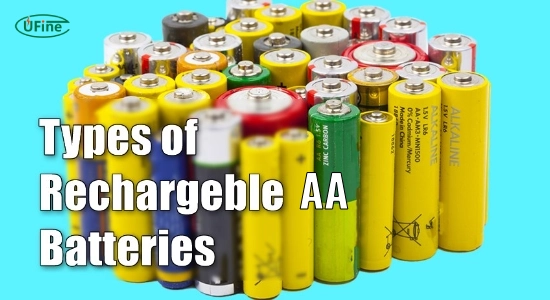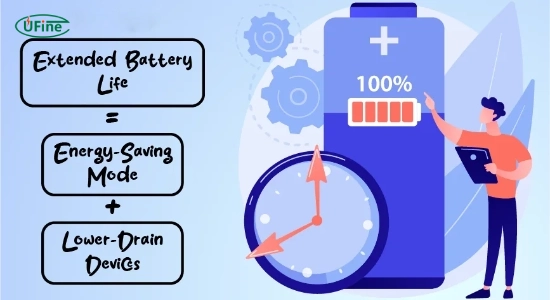Rechargeable AA batteries are popular for powering various devices, from remote controls to digital cameras. Understanding their lifespan is crucial for consumers who want to make the most out of their investment. In this article, we will explore the factors that influence the longevity of rechargeable AA batteries, the different types available, and how to maximize their lifespan.
Part 1. What are rechargeable AA batteries and their types?
Rechargeable AA batteries come in various chemistries, with Nickel-Metal Hydride (NiMH) and Lithium being the most common.
- NiMH Batteries: These are widely used because they can be recharged multiple times—typically between 500 and 1000 cycles. They have a nominal voltage of 1.2V and are known for their stable power output, making them ideal for high-drain devices like cameras and game controllers. NiMH batteries also come in low-self-discharge versions, which can hold their charge longer when not in use.
- Lithium Batteries: Unlike NiMH, lithium rechargeable batteries usually provide a higher voltage of 1.5V and are known for their long shelf life and low self-discharge rates. They can maintain their charge for extended periods, even when not used. Many people prefer lithium batteries for devices that require consistent power over time.
Both types of rechargeable AA batteries offer unique advantages depending on your needs.
Part 2. Factors influencing the lifespan of rechargeable AA batteries
The lifespan of rechargeable AA batteries can vary significantly based on several factors:
- Quality of the Battery: Higher-quality brands like Eneloop or Energizer last longer than generic options. Investing in reputable brands can save you money in the long run, as they often provide better performance and longevity.
- Usage Patterns: The frequency and type of use play a significant role. High-drain devices like digital cameras may deplete batteries faster than low-drain devices like remote controls or wall clocks. Understanding your device use can help you choose the right battery type.
- Charging Practices: Proper charging techniques can enhance battery life. Overcharging or using incompatible chargers can damage batteries and reduce their overall lifespan. Always follow manufacturer guidelines for charging.
- Storage Conditions: Storing batteries in extreme temperatures can negatively impact their lifespan. Store them in a cool, dry place away from direct sunlight. Keeping them at room temperature helps maintain their performance.
Part 3. Average lifespan of rechargeable AA batteries
Depending on the factors mentioned above, rechargeable AA batteries can last an average of 2 to 10 years.
- Low Usage: If you use your batteries infrequently and store them correctly, they may last closer to the upper end of this range. For example, if you only use them in a seldom-used remote control, they could last several years.
- High Usage: In contrast, if you frequently use them in high-drain devices like digital cameras or gaming controllers, expect a lifespan closer to the lower end. Regularly using them in demanding applications will lead to faster depletion.
Part 4. How many times can you recharge them?
The number of recharge cycles varies by chemistry:
- NiMH Batteries: Typically last for about 500 to 1000 charge cycles under normal conditions. Charging your NiMH battery once a week could last 10 to 20 years before needing replacement.
- Lithium Batteries: Due to their superior technology and lower self-discharge rate, lithium batteries can last over 1000 cycles. They are ideal for users who want long-lasting power without frequent replacements.
This means that with proper care, you could use your rechargeable AA batteries for several years before needing replacements.
Part 5. How to maximize the lifespan of rechargeable AA batteries?
To ensure your rechargeable AA batteries last as long as possible, consider the following tips:
- Use a Smart Charger: Invest in a charger that automatically stops charging when the battery is full. This prevents overcharging, which can damage the battery over time.
- Avoid Deep Discharges: Do not let your batteries fully discharge before recharging; this can significantly shorten their lifespan. Instead, recharge them when they reach about 20% capacity.
- Regular Maintenance: Charge your batteries at least once every few months, if not in regular use, to prevent them from going into deep discharge mode. This practice helps maintain their health over time.
- Rotate Your Batteries: If you have multiple rechargeable batteries, rotate them regularly so that all sets get equal usage and charging cycles.
Part 6. Common misconceptions about rechargeable batteries
Many misconceptions surround rechargeable AA batteries:
- They Don’t Last as Long as Alkaline Batteries: While it’s true that alkaline batteries have a higher initial voltage (1.5V), rechargeable NiMH batteries provide consistent power over time, especially in high-drain devices where they excel.
- They Suffer from Memory Effect: This was a common issue with older NiCd batteries but is largely irrelevant for modern NiMH and lithium technologies. Most users do not need to worry about memory effects impacting performance.
Part 7. Environmental impact of rechargeable batteries
Rechargeable AA batteries are generally more environmentally friendly than disposable ones:
- Reduced Waste: Users can reuse them hundreds or thousands of times, reducing waste compared to single-use alkaline batteries. This makes them a more sustainable choice for consumers concerned about waste management.
- Recyclability: Most rechargeable batteries can be recycled at designated facilities, minimizing environmental impact. Proper disposal helps prevent harmful chemicals from entering landfills.
Part 8. Signs your rechargeable AA batteries need replacement
Knowing when to replace your rechargeable AA batteries is essential for maintaining device performance:
- Reduced Capacity: If your devices are not operating as long as they used to on a single charge, it may be time for new batteries. A significant drop in performance is often an indicator that replacement is necessary.
- Physical Damage: If you notice any swelling or leakage, replace the battery immediately to avoid potential hazards or damage to your devices.
Part 9. FAQs
-
How long do rechargeable AA batteries last?
Depending on usage patterns and care practices, rechargeable AA batteries typically last between 2 to 10 years. -
Can I use rechargeable AA batteries in any device?
Yes, as long as the device is compatible with standard AA battery sizes; however, check if it requires specific voltage levels for optimal performance. -
Do I need a special charger for rechargeable AA batteries?
It is recommended that you use a charger explicitly designed for NiMH or lithium rechargeable batteries for optimal performance and safety during charging. -
What should I do if my rechargeable battery won’t hold a charge?
If your rechargeable battery no longer holds a charge, it may be time to replace it with a new one, as it has likely reached the end of its usable life cycle. -
Can I mix different brands of rechargeable AA batteries?
Mixing different brands or types of rechargeable batteries in the same device is not advisable, as this can lead to uneven discharge rates and potential damage to both the device and the batteries themselves.
Related Tags:
More Articles

How to Choose the Best Floor Scrubber Battery for Commercial Cleaning?
Selecting the ideal floor scrubber battery ensures a long runtime, rapid charging, and minimal maintenance for efficient commercial cleaning operations.
Battery for Blower vs Battery for Leaf Vacuum: Which One Should You Choose?
Battery for blower vs leaf vacuum—learn the key differences in power, fit, and runtime to choose the right battery for your outdoor tool needs.
How to Choose the Right Battery for Blower?
Choosing the right blower battery? Consider voltage, capacity, chemistry & usage. This guide helps match the best battery for peak performance.
How to Choose the Best Insulated Battery Box for Lithium Batteries?
Choosing the Best Insulated Battery Box for Lithium Batteries? Discover key factors such as size, material, and safety for optimal protection and performance.
7 Critical Elements on a Lithium Battery Shipping Label
What must be on a lithium battery shipping label? Learn 7 key elements to ensure safety, legal compliance, and correct handling across all transport modes.






